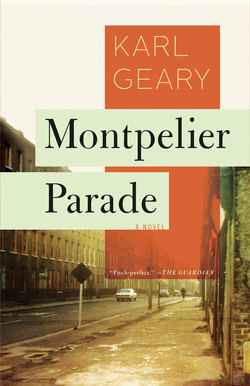Читать книгу Montpelier Parade - Karl Geary - Страница 11
На сайте Литреса книга снята с продажи.
Оглавление5
Walking home across the green through the thickening dusk, you saw your mother’s shadow at the window, behind the net curtains, trying to hide. You knew she had been there for hours.
“Where’s your father?” she says as you cleared the doorway, and you felt her fingers lock around your wrist.
“Don’t know,” you say.
“How could you not know? Weren’t you with him?”
“Yeah.”
“Well?”
She was small, your mother, not more than five feet.
“He just dropped me at the corner,” you say.
“Did he go to the bookies?”
“Don’t know.” Her grip held you in place. You knew you could push past her, but not without being rough. Your eyes fell on the wool pattern of her cardigan, the blended strands of pink and gray and white. At the elbow, where the wool pulled tighter, her skin showed underneath.
“Did he get paid?” she says.
“I don’t know.”
“Did he pay you?” she says, and you were lost.
“No.”
“Bastard,” she says, letting go of your arm, leaving you for the brothers in the living room. You ran upstairs. “Can you fathom that?” you heard her say. “He didn’t even give the young lad any money, none . . . the rotten get.”
It was the weekend, so you were allowed a bath. The stains ran from your naked body and colored the few inches of cooling water. Your arms, your back, your knees exposed.
You lay back and felt a chill on the inside of your thigh where the water stopped. You closed your eyes, like stepping out of your own body. The water gently lapped at your skin. Your prick was hard.
You held her to you, her lips wide. “Please,” she says. You could feel her press against you. “Please.”
Downstairs, when you were dressed, your jeans felt tight and clean. In your coat pocket in the hallway you hid seven pounds and a pocketknife, a cigarette wrapped in toilet paper, and three red matches too. You were unable to get all the dirt from under your fingernails and were no longer proud of it.
It was after six, and the bookies closed at six. Your father would lose, he mostly did, and then there was nowhere else to come but home. You ate your dinner, the clock ticked, and your mother paced the rooms—from the front window, where she’d watch for his car, then back out to your brothers, where they sat wordless, spread across chairs in a vigil. You ate quickly. She’d start at him when he got in, use what she could to hurt him, use you. You stood up from the table, and she noticed the unfinished plate.
“Where are you going?” she says.
“Nowhere,” you say. “I’m not hungry.” But you knew you had to tell her that you were going out; she worried, and you couldn’t stand that.
“That’s him now, Ma.” One of your brothers saw his car coming down the road and pulling up alongside the house. Your mother froze a second, then went to the window to see for herself. From the kitchen you heard the hand brake being drawn, the engine shudder and die. She was quick from the window back to the kitchen. She rubbed her hands like she was cold, and her gathered thoughts seemed to confuse and frighten her.
“I’m going out,” you say, and propelled yourself toward the hallway.
“Out, out where?”
You had only a moment before he came through the door. You took your green army coat from the hook, your favorite coat, the coat you wore to feel strong, sometimes invincible. You eyed the lock and expected it to turn. You couldn’t go that way. You couldn’t face him. You went back to the kitchen.
“Just out,” you say.
She followed quickly behind. “With who?”
“No one,” you say, putting on your coat. Quieting the coins in your pocket between your fingers.
“You’re going out in that night, on your own?”
The fat your mother used to fry the chips had cooled, and now a brown skin had begun to congeal across the unwashed plates.
The front door opened. Your father was home. You heard his heavy footsteps on the stairs; he’d gone up to hide whatever money he had left. You imagined all the hiding places all through the house, every cavity stuffed with secrets.
Your mother looked at you. “Go then,” she says in a simple way, and retreated into the room with your brothers. You felt the first flash of a hot tear.
Out the back door. In a single movement you’d scaled the little coal bunker and scrambled onto the eight-foot garden wall. From there you pulled yourself up onto the roof of the shed. The corrugated metal cried out in rhythm with your feet. You dropped to the other side and ran. Ran past the hall door, the white Ford, farther out across the green until you saw the first lights of the shops, heard the trucks on the main road, where you folded over and filled your burning chest with the night air.
